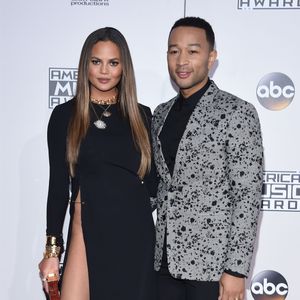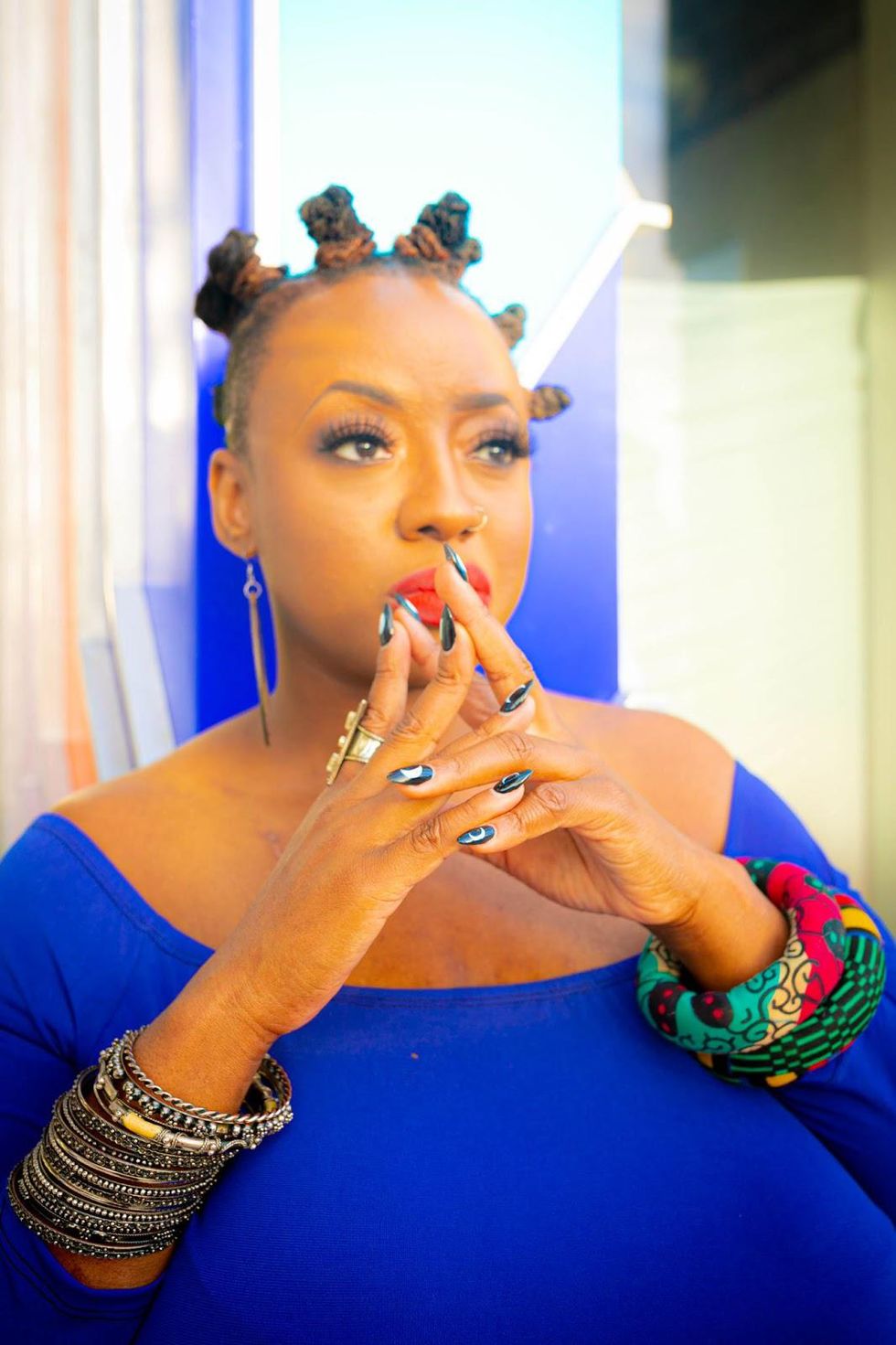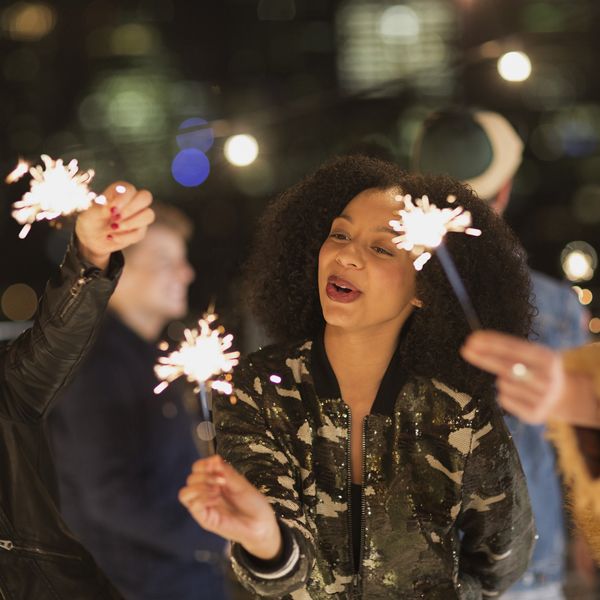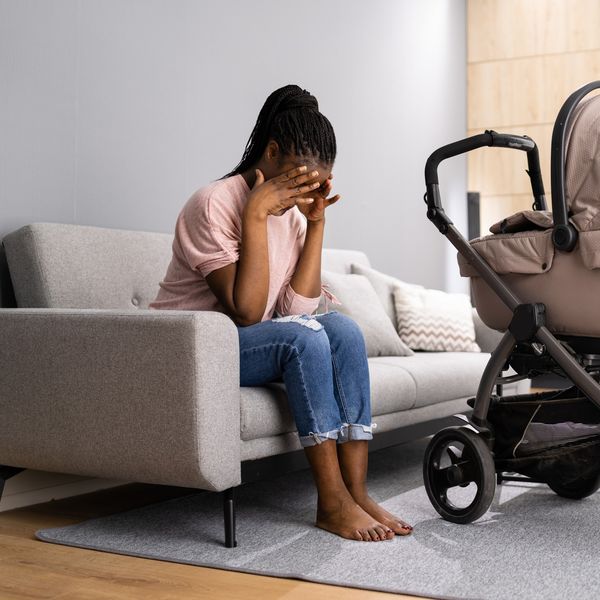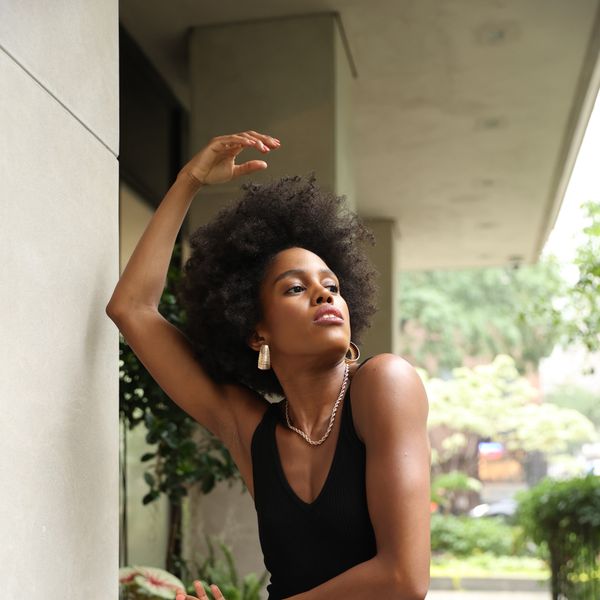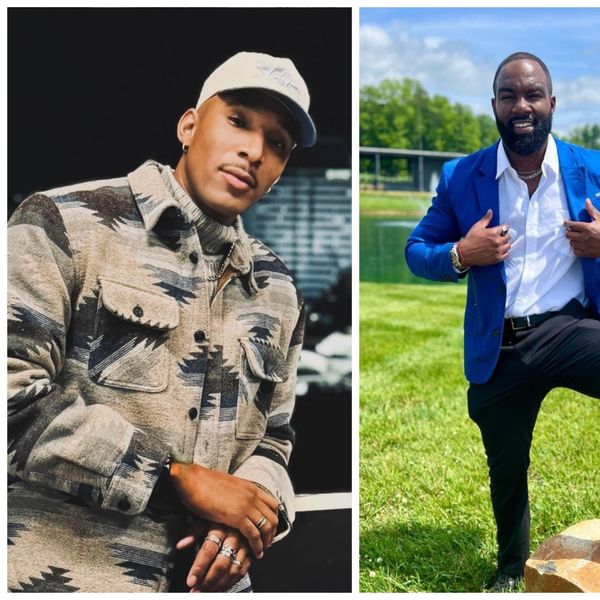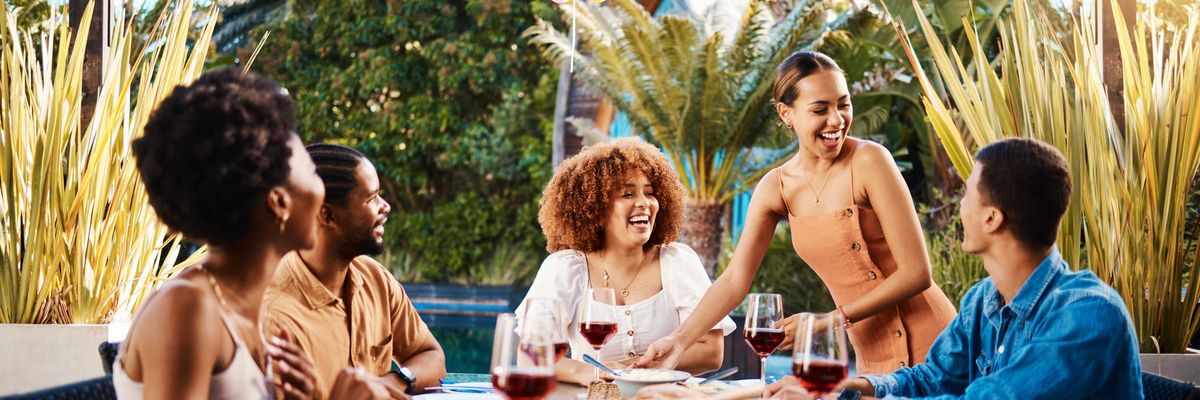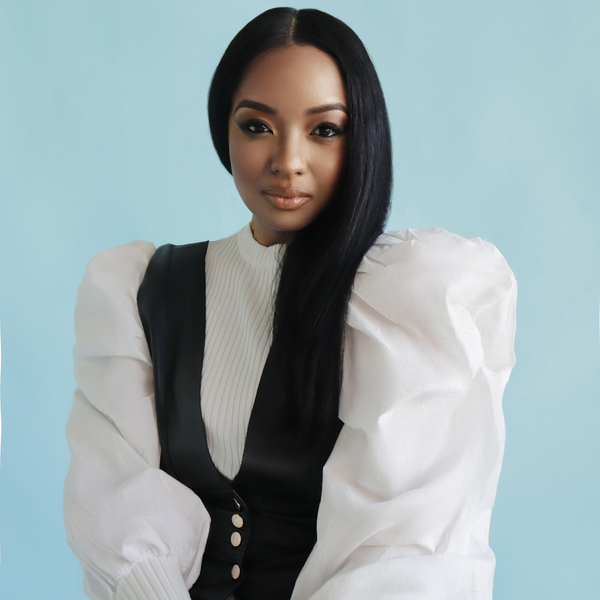
Juneteenth aka Freedom Day aka Emancipation Day aka June 19, 1865, commemorates the actual end of slavery. Contrary to popular belief, July 4, 1776, was not inclusive of all people per America's modus operandi; the 4th of July only represents the day that white male Americans became free. Thanks to social activists and the movement that is Black culture, Juneteenth's history, meaning, and importance have become more prevalent over the past few years.
It wasn't until very recently that I learned that the Statue of Liberty doesn't only represent the strength and resilience of immigrants but was initially created to celebrate the emancipation of slaves. The more I learn about Juneteenth the more I feel an immense duty to celebrate my blackness every day but even more on June 19th. We owe it to General Granger, the Union soldiers, and our ancestors to celebrate the culture and achievements of Black folks because we deserve that. We deserve celebration.
As we continue to live out loud, we thought it was important to share the stories of the women who show up for the culture and fight for freedom from all chains every day. Keep reading for what that looks like for these social justice mavens.
Share the story of how you learned about Juneteenth.
Now that I look back on growing up in the Midwest with a household of four generations, our daily life defined how we had overcome so many racial injustices and impacts of slavery. My grandfather migrated to Detroit, Michigan for a job in the factory shortly after becoming an entrepreneur and buying a home in a prestigious Detroit neighborhood where blacks weren't welcome at one point and time. My grandmother worked a good job at the hospital and my mom was the first to go to college in our family. They worked hard and we lived well, with almost every holiday being a really big occasion showcasing our gratitude and how far our family had come with my grandfather sharing stories of how he remembers his grandparents who picked cotton — Juneteenth was an empowering day filled with family traditions in the backyard.
What does Juneteenth mean to you?
When [talking about] slavery, I like to make a conscious effort to look at it with a multi-lens approach rather than just the 400 years America dates it to. Juneteenth is an opportunity to learn, share and express the knowledge and truth of who black people were before slavery, what we went through as slaves, and how we are moving toward the future.
How do you define freedom?
Freedom is the ability to think, do and be with no limits or restraints whether that be physical, mental or emotional. While freedom for my ancestors meant not being a slave and having full citizenship rights, in today's time my generation is facing the challenges of breaking free from a learned limiting mindset to a life of unlimited possibility and purpose.
How are you celebrating Juneteenth this year?
My life's work holds the commitment of being even more intentional about my servant leadership dedicating philanthropic time and efforts to racial disparities of black Americans. Later this year, a national non-profit that I co-founded with an amazing group of leaders will be launching that positively impact black Americans who have been impacted by slavery. Having a direct hand in the impact of racial disparities of wealth that still impacts community, families, and individuals is something that should not be swept under the rug, but confronted in the most honest and transformational way. We are coming to change generations.
Share the story of how you learned about Juneteenth.
I feel like the story of Juneteenth is a story that has always lived with me and has been part of the fabric of my life that has informed my Blackness. I cannot pinpoint when exactly I learned about it. I remember feeling literal jubilee when learning that my people wasted no time once they learned they were free exiting those plantations and casting off the label of chattel.
What does Juneteenth mean to you?
Juneteenth is about ancestral veneration and commemorating the bold act of love that our ancestors exercised in choosing to live and survive under the most horrific circumstances. Juneteenth also reminds me that you truly cannot stop freedom from coming. You cannot stop the freedom train because it is always on time.
How do you define freedom?
Angela Davis teaches us that "freedom is a constant struggle." Which means we must always struggle to keep it, take it, and define it for ourselves. Freedom to me is Black people being free from premature death engineered by racism, Black people being able to love themselves and embody their gender and sexuality as they define them and freedom to access their bodily sovereignty without the fear of state violence or interference. Black people being free to access the full range of their emotions, rest, and joy while having all of their basic needs met and not feeling like they must be excellent to matter. This freedom cannot happen unless our indigenous kin gets their lands back and figure out how to stop this climate disaster.
How are you celebrating Juneteenth this year?
I will journal, tend to my altar, meditate on freedom, and share the love with the Black people in my life.
"Juneteenth is a time for all Black people situated in these United States never to forget that we are miracles. We were not meant to survive, and yet here we are. We must not ever forget that no Black person is free until we are all free."
Juneteenth being in Pride Month is also an invitation for all Black people to never forget about our queer, transgender, and non-binary kin whose freedom is also bound up with our collective Black freedom. There were queer folks on the plantation and those slave ships. It's all of us or none of us.
Share the story of how you learned about Juneteenth.
I grew up in New York City, when I was about six or seven, I went to the Juneteenth festival in Harlem with my grandparents. That's when I first learned about Juneteenth. I initially learned about it as a celebration of life. As the years progressed, I was introduced to more of the history and I was able to engage in thoughtful conversations with the elders of my family. My grandparents are "Old World" Harlem, they spent a lot of time when I was a child and even now in their 91 years of living, teaching me and younger members of my family who we are and where we come from.
What does Juneteenth mean to you?
Juneteenth is a reminder that I do not exist alone and I am a reflection of every single one of my ancestors. I like to think of myself as an embodied figure of ghosts. Juneteenth reminds me that I am rooted in their struggles and their joys on a day-to-day basis.
How do you define freedom?
Freedom is waking up every morning and thanking the spirits who cradled me as I slept and who will have my back all day as I fulfill their wildest dreams. Freedom is curiosity; it's the space to be curious about me and this world. Freedom is detangling myself from the racist, sexist, capitalist, and colonized structures of our society that attempt to grip me and hold me down. Freedom is liberation and liberation is an internal experience that cannot be taken away.
How are you celebrating Juneteenth this year?
This probably isn't the most exciting response, but I will celebrate as I celebrate my life every day, by giving thanks to those who came before me and showing myself the utmost respect and care by choosing to rest because I and they deserve it.
Share the story of how you learned about Juneteenth.
Growing up, I never knew the importance of Juneteenth. I just knew my family and community would celebrate by coming together to barbecue, gather and talk. That was the norm for many years until I was old enough to research on my own. What I thought I knew, just a generic version of the truth, became much greater and important to me. The day enslaved African-Americans learned they were free in the south. This meant free from bondage, free from abuse, free from "ownership". This was also a turn for African-Americans as this moment emphasized achievements and education.
What does Juneteenth mean to you?
Juneteenth inspires me to keep educating my community about the modern-day liberations we deserve as a community. Never forget how far we've come as a community and how far we need to go as a community. Juneteenth is more than barbecuing and gathering, although we deserve it plus more, but it also means celebrating the sacrifices our ancestors took for us to get here.
How do you define freedom?
Some people believe because we're "free" we have "freedom". Freedom for me looks like reparations for my community. Equal opportunity for my community. An equal justice system for my community. Free from the mental chains placed on our black men and boys as they step foot out their doors. Physically free from the harsh sentencing placed on our minority community for small defenses. Freedom comes in many forms, because we are free from the chains does not mean we are truly free in this country.
How are you celebrating Juneteenth this year?
This year is different for me in terms of celebrating because of the pandemic. I usually participate in marches, rallies, and conferences. This year I will educate my community virtually by going live via social media and spreading knowledge to others. Also, go grab some of that barbecue my family loves to make.
Last year and this year there was a spark within grassroots leaders and fighters. It amazed me to see how much attention was brought to an ongoing fight within our community. As a community, let's keep this fight going on and off the streets and remember we have children looking up to us. We must pave the way for them as our ancestors did for us.
Featured image courtesy of Meagan Ward
Because We Are Still IT, Girl: It Girl 100 Returns
Last year, when our xoNecole team dropped our inaugural It Girl 100 honoree list, the world felt, ahem, a bit brighter.
It was March 2024, and we still had a Black woman as the Vice President of the United States. DEI rollbacks weren’t being tossed around like confetti. And more than 300,000 Black women were still gainfully employed in the workforce.
Though that was just nineteen months ago, things were different. Perhaps the world then felt more receptive to our light as Black women.
At the time, we launched It Girl 100 to spotlight the huge motion we were making as dope, GenZennial Black women leaving our mark on culture. The girls were on the rise, flourishing, drinking their water, minding their business, leading companies, and learning to do it all softly, in rest. We wanted to celebrate that momentum—because we love that for us.
So, we handpicked one hundred It Girls who embody that palpable It Factor moving through us as young Black women, the kind of motion lighting up the world both IRL and across the internet.
It Girl 100 became xoNecole’s most successful program, with the hashtag organically reaching more than forty million impressions on Instagram in just twenty-four hours. Yes, it caught on like wildfire because we celebrated some of the most brilliant and influential GenZennial women of color setting trends and shaping culture. But more than that, it resonated because the women we celebrated felt seen.
Many were already known in their industries for keeping this generation fly and lit, but rarely received recognition or flowers. It Girl 100 became a safe space to be uplifted, and for us as Black women to bask in what felt like an era of our brilliance, beauty, and boundless influence on full display.
And then, almost overnight, it was as if the rug was pulled from under us as Black women, as the It Girls of the world.
Our much-needed, much-deserved season of ease and soft living quickly metamorphosed into a time of self-preservation and survival. Our motion and economic progression seemed strategically slowed, our light under siege.
The air feels heavier now. The headlines colder. Our Black girl magic is being picked apart and politicized for simply existing.
With that climate shift, as we prepare to launch our second annual It Girl 100 honoree list, our team has had to dig deep on the purpose and intention behind this year’s list. Knowing the spirit of It Girl 100 is about motion, sauce, strides, and progression, how do we celebrate amid uncertainty and collective grief when the juice feels like it is being squeezed out of us?
As we wrestled with that question, we were reminded that this tension isn’t new. Black women have always had to find joy in the midst of struggle, to create light even in the darkest corners. We have carried the weight of scrutiny for generations, expected to be strong, to serve, to smile through the sting. But this moment feels different. It feels deeply personal.
We are living at the intersection of liberation and backlash. We are learning to take off our capes, to say no when we are tired, to embrace softness without apology.
And somehow, the world has found new ways to punish us for it.

In lifestyle, women like Kayla Nicole and Ayesha Curry have been ridiculed for daring to choose themselves. Tracee Ellis Ross was labeled bitter for speaking her truth about love. Meghan Markle, still, cannot breathe without critique.
In politics, Kamala Harris, Letitia James, and Jasmine Crockett are dragged through the mud for standing tall in rooms not built for them.
In sports, Angel Reese, Coco Gauff, and Taylor Townsend have been reminded that even excellence will not shield you from racism or judgment.

In business, visionaries like Diarrha N’Diaye-Mbaye and Melissa Butler are fighting to keep their dreams alive in an economy that too often forgets us first.
Even our icons, Beyoncé, Serena, and SZA, have faced criticism simply for evolving beyond the boxes society tried to keep them in.
From everyday women to cultural phenoms, the pattern is the same. Our light is being tested.

And yet, somehow, through it all, we are still showing up as that girl, and that deserves to be celebrated.
Because while the world debates our worth, we keep raising our value. And that proof is all around us.
This year alone, Naomi Osaka returned from motherhood and mental health challenges to reach the semifinals of the US Open. A’ja Wilson claimed another MVP, reminding us that beauty and dominance can coexist. Brandy and Monica are snatching our edges on tour. Kahlana Barfield Brown sold out her new line in the face of a retailer that had been canceled. And Melissa Butler’s company, The Lip Bar, is projecting a forty percent surge in sales.

We are no longer defining strength by how much pain we can endure. We are defining it by the unbreakable light we continue to radiate.
We are the women walking our daily steps and also continuing to run solid businesses. We are growing in love, taking solo trips, laughing until it hurts, raising babies and ideas, drinking our green juice, and praying our peace back into existence.
We are rediscovering the joy of rest and realizing that softness is not weakness, it is strategy.
And through it all, we continue to lift one another. Emma Grede is creating seats at the table. Valeisha Butterfield has started a fund for jobless Black women. Arian Simone is leading in media with fearless conviction. We are pouring into each other in ways the world rarely sees but always feels.

So yes, we are in the midst of societal warfare. Yes, we are being tested. Yes, we are facing economic strain, political targeting, and public scrutiny. But even war cannot dim a light that is divinely ours.
And we are still shining.
And we are still softening.
And we are still creating.
And we are still It.

That is the quiet magic of Black womanhood, our ability to hold both truth and triumph in the same breath, to say yes, and to life’s contradictions.
It is no coincidence that this year, as SheaMoisture embraces the message “Yes, And,” they stand beside us as partners in celebrating this class of It Girls. Because that phrase, those two simple words, capture the very essence of this moment.
Yes, we are tired. And we are still rising.
Yes, we are questioned. And we are the answer.
Yes, we are bruised. And we are still beautiful.

This year’s It Girl 100 is more than a list. It is a love letter to every Black woman who dares to live out loud in a world that would rather she whisper. This year’s class is living proof of “Yes, And,” women who are finding ways to thrive and to heal, to build and to rest, to lead and to love, all at once.
It is proof that our joy is not naive, our success not accidental. It is the reminder that our light has never needed permission.
So without further ado, we celebrate the It Girl 100 Class of 2025–2026.
We celebrate the millions of us who keep doing it with grace, grit, and glory.
Because despite it all, we still shine.
Because we are still her.
Because we are still IT, girl.
Meet all 100 women shaping culture in the It Girl 100 Class of 2025. View the complete list of honorees here.
Featured image by xoStaff
Give Thanks: 10 Tips For Hosting An Absolutely Awesome Friendsgiving
If you’ve never checked out an episode of the ReLiving Single Podcast featuring Maxine and Synclaire — oops, I mean Erika Alexander and Kim Coles — it’s worth listening to an episode or two; especially if you’re someone like me who watches the Living Single reruns on TV One, sometimes, like they just came out. Good times.
And what does this even remotely have to do with Friendsgiving? Well, if you ever wondered what the origin story of this non-holiday-holiday is, legend has it that it’s mostly due to the combination of a 2007 tweet and the show that tries to act like it wasn’t birthed out of Living Single: Friends (I’m not the only one who feels this way either; you can read more about all of that here, here and here).
Apparently, there was a Thanksgiving episode that featured all of the friends having dinner together. And y’all, there was simply no way that I was going to mention the latter without shouting out the original (amen?).
Okay, so with that out of the way — Friendsgiving. Something that I appreciate about twists to holidays like this is that it’s a reminder that there is no one way to celebrate special occasions. And so, if, for whatever the reason, you will not or cannot be with family during the holiday season, there are certainly other alternatives at your disposal.
That being said, if the thought of spending time with friends this Thanksgiving is something that you’d like to do, yet you’re not sure how to host it in a way that will make Friendsgiving a fan favorite for your entire circle — I’ve got 10 suggestions that can make the planning process easy as pumpkin (or sweet potato) pie.
1. Position Chrysanthemums or Orchids for Your Table Décor
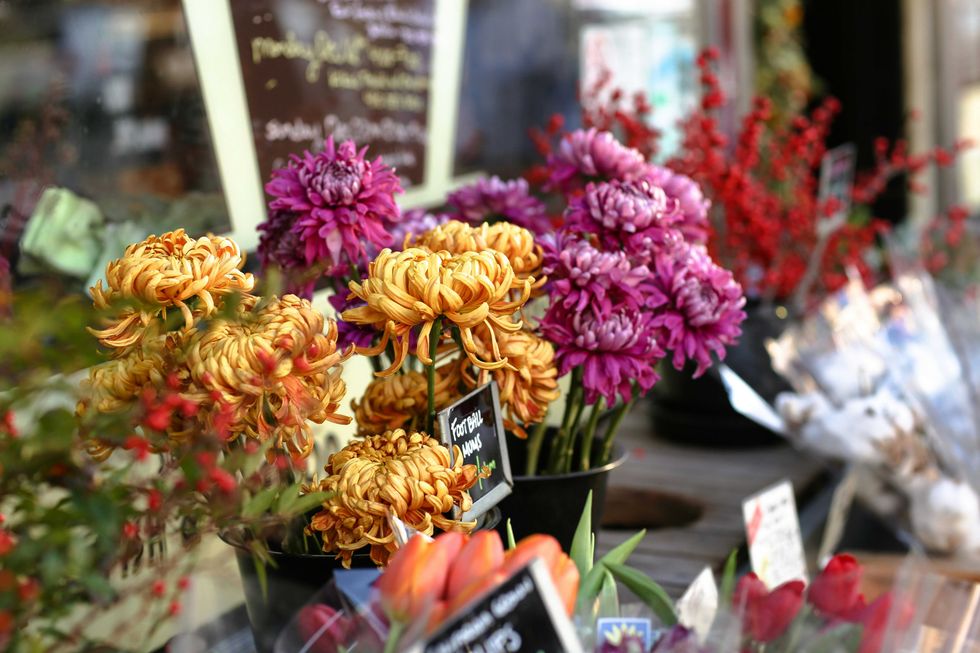
Unsplash
Let’s start with décor first. Listen, aside from cleaning up your place, you don’t have to be over the top. If you put together a really nice centerpiece or put a flower at each table setting, honestly, you’re all good. And if you’re someone who is big on details and symbolism, my recommendation would be to go with some chrysanthemums and/or orchids.
When it comes to chrysanthemums, not only are they a peak fall flower, they represent things like friendship and happiness. And orchids? They tend to bloom during the fall and spring seasons and, not only are they about luxury, certain orchid colors also symbolize friendship (for the record, yellow roses symbolize friendship too). Perfect.
2. Incorporate Scents That Cultivate Gratitude
Speaking of cultivating a warm and inviting space, you can never go wrong with scented soy candles — or at least having an essential oil diffuser in a few spots. Some scents that actually help to bring in the spirit of gratitude include vanilla, jasmine, ginger, cedarwood and frankincense.
3. Use Upscale Paper Products to Dine With
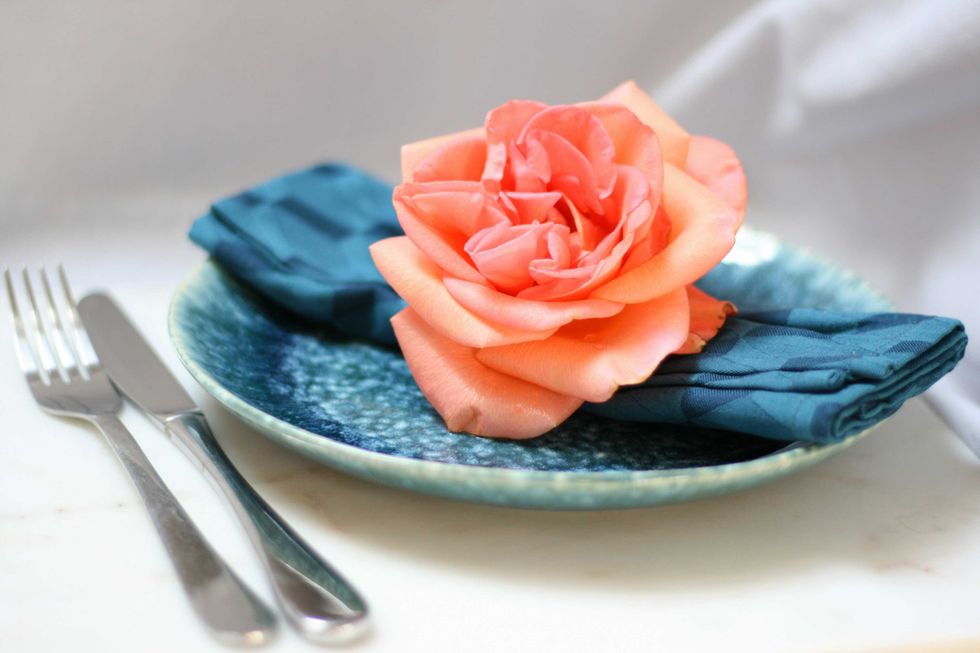
Unsplash
Let’s be real — a lot more of us would probably host events in our home if it wasn’t for the mess that is left behind in our kitchen once the festivities are over. Wanna avoid that? Use paper plates. No, I don’t mean the cheap Styrofoam ones. SMDH. These days, there are paper (and plastic) plate brands that will low-key blow your mind when it comes to how bougie they look. Some that are worth considering are located here, here and here.
4. Handwrite Thank-You Notes (Use Them As Place Settings)
If you’re like Tiffany (from the HBO series Insecure — what a time) was at that memorable dinner party when all hell broke loose between Lawrence and Issa and you’re pretty anal — I mean, particular — LOL — about place settings, it’s a nice touch to pick up some blank thank-you cards that you can write a personalized “I’m thankful for you because…” message in. Place each one where you’d like each friend to sit. They won’t see it coming and it’s a really nice touch.
5. Have Everyone Bring Their Favorite Homemade Dish
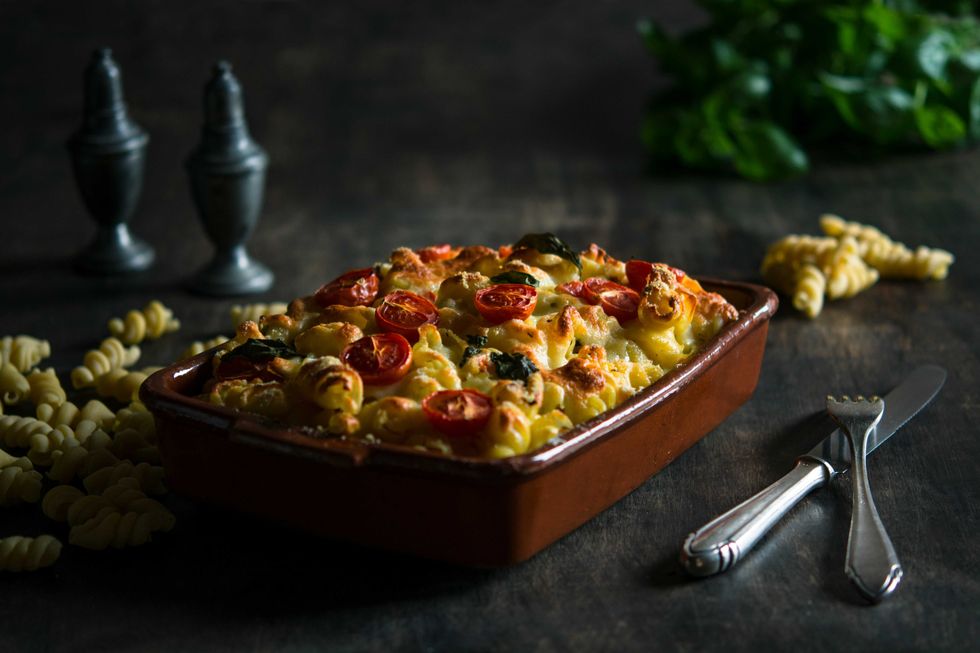
Unsplash
Okay, and what if what has you on the fence about hosting is you don’t feel like doing a ton of cooking? Chile, this is where the concept of having a potluck comes in. Get everyone to bring the dish that they claim they cook the best and make sure to let them know how many individuals you plan on coming (so that they will make enough). You can even make a game out of it by having everyone anonymously vote for the first, second and third best dishes out of the bunch. Take it up a notch by having a prize for each winner.
6. Take a Warm Drink and Dessert Poll Beforehand
You know what isn’t discussed enough about dinner parties? Folks bringing desserts that other people don’t even like. SMDH. You can avoid this from becoming an issue at your Friendsgiving by sending an email (most people prefer that to group chats; let’s be real — and make sure to BCC everyone as well) asking everyone to share what their top three favorite desserts and warm drinks are. Then pick the top 2-3 out of the bunch. That way, you won’t have a ton of (for instance) coffee cake or apple cider lying around that no one even wanted in the first place.
7. Create a Signature Friendsgiving Mocktail and Cocktail
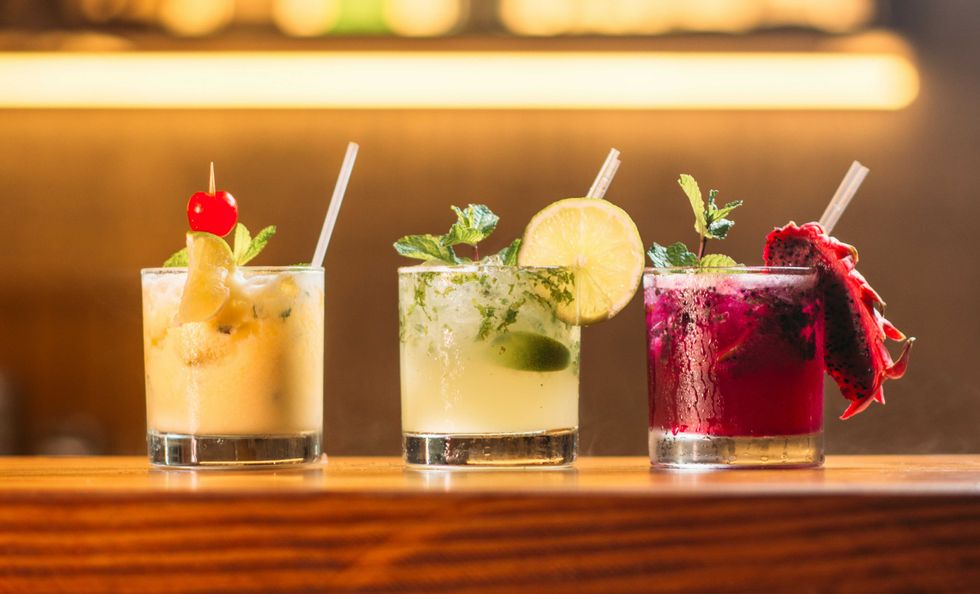
Unsplash
Speaking of drinks, another way to make your Friendsgiving memorable is to come up with a signature mocktail (for those who don’t consume alcohol) and cocktail. For the mocktail, you can also poll your friends about their favorite mocktail or fruits and come up with a mixture of your own. For the cocktail — although National Friendship Day is actually in August, I did peep that there are certain drinks that have been created in its honor. Some of them are located here for you to do a bit of tweaking on (if you’d like).
8. Ask Everyone to Share Their “Favorite Friend Quality” of Another
You know how it’s customary for everyone to go around and share what they are truly thankful for before having dinner? Well, to continue along with the Friendsgiving theme, have each person share what their favorite friend quality is about the person to their right. If folks are just meeting each other for the first time, instead they can share what they value the most in friendship overall, along with a story of how it was displayed to them personally over the past 12 months.
9. Send Each of Your Guests Home with a Fresh Gratitude Journal
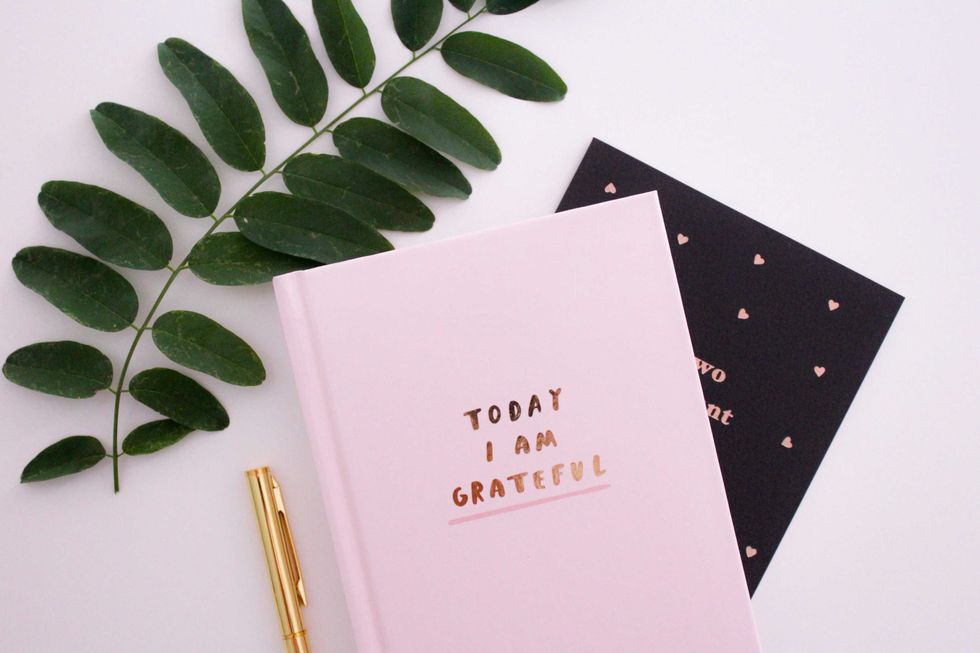
Unsplash
Wanna send folks home with a nice parting gift? It would be so on-trend to give each of them a gratitude journal. Listen, we are in some crazy times right through here (at least in the States) and so, encouraging your friends to set some time aside, regularly, to think about and then outwardly express what they are grateful for? That helps to keep stress down, keep things in perspective and it reminds us all to maintain a positive mindset as much as possible.
10. Watch a Nostalgic Movie
While everyone is enjoying dessert and drinks, how about watching a movie that brings back fond memories? A list of some of the most popular movies to come out previous Thanksgiving weekends is located here and a list of some favorite Black holiday-themed films can be found here. It’s a way to wind down and share some laughs before everyone heads home.
___
Friendsgiving. What a wonderful way to celebrate your friends while also observing Thanksgiving in a way that is totally on your terms. And now that you know how to put it together, what are you waiting for? Hit your friends up and let them know that, whether it’s on actual Thanksgiving Day or a few days before or after, you’ve got a special dinner in mind.
One that has a good time with amazing friends written ALL over it.
Let’s make things inbox official! Sign up for the xoNecole newsletter for love, wellness, career, and exclusive content delivered straight to your inbox.
Featured image by PeopleImages/Shutterstock


